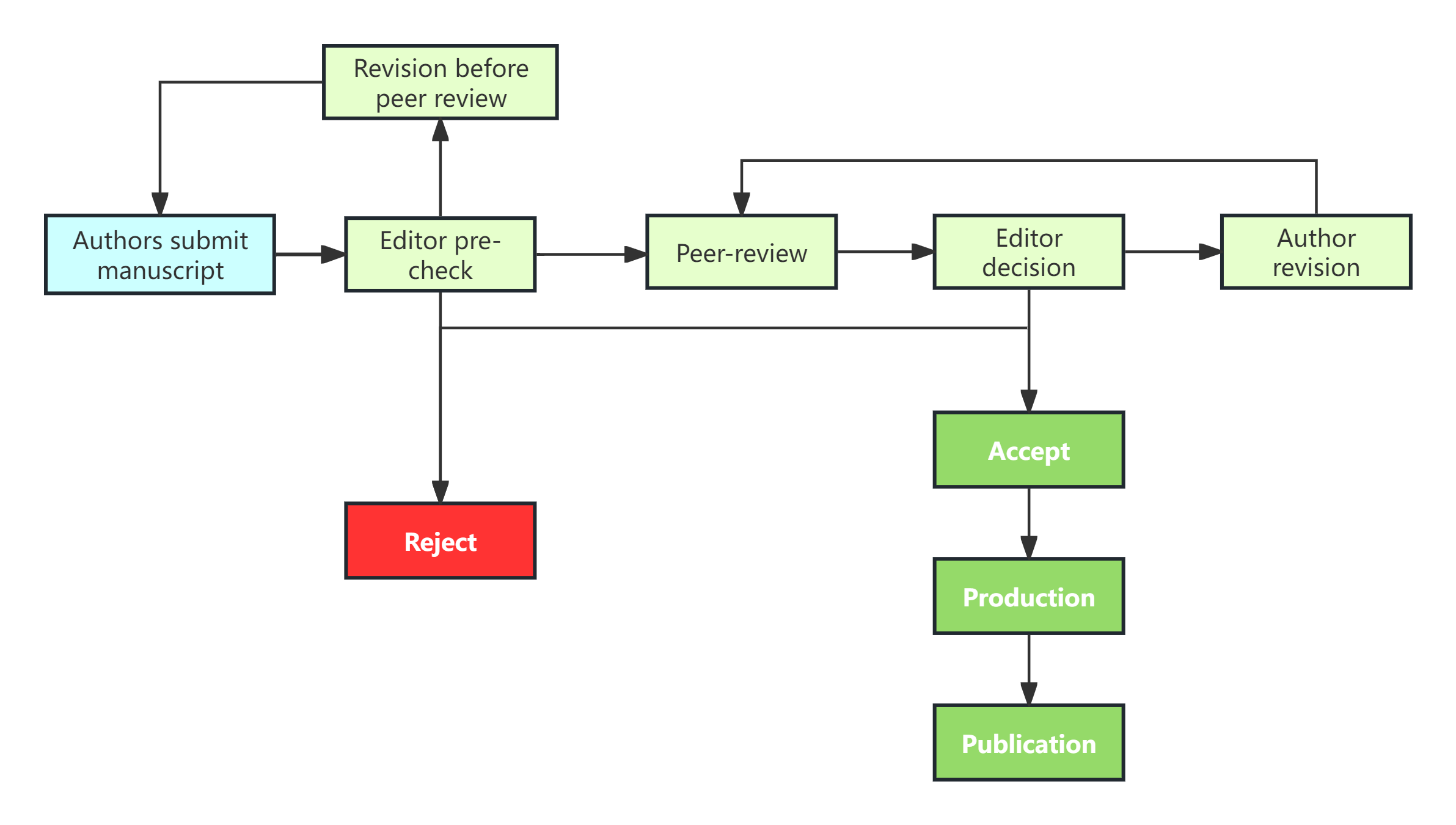
Editorial Process
To maintains the highest quality standards for our published papers, all submissions to our journals are strictly and thoroughly peer-reviewed by experts. FFSP adopts single-blind/double-blind peer-review with at least two independent reviewers, followed by a final acceptance/rejection decision by the Editor-in-Chief or another Academic Editor from Editorial Team. In double-blind peer review, both the reviewers and authors are anonymous.
All articles submitted to our journals are processed according to the following process.

1. Editor Pre-Check
When we received a submission, the editornal office will initial check it to ensure it meets the journal’s basic standards, including the formatting, grammar, scope, ethical standards and plagiarism check. According the results, the manuscript will be desk rejected, request the autors revision before peer review or send to academic editor pre-check.
In the academic editor pre-check stage, the academic editor (Editor-in-Chief or assigned Editorial Board Member) will then evaluate the manuscript’s scientific soundness, relevance to the journal’s scope, and overall quality. Manuscripts that do not meet these criteria may be rejected or returned for revision before proceeding to peer review.
Authors are encouraged to review the journal’s Instructions to Authors to ensure their work aligns with journal‘ aims and scope. This step helps maintain the quality and relevance of submissions and streamlines the subsequent peer review process.
2. Peer Review
Manuscripts that pass the editor pre-check will be assigned to at least two independent experts in the field for peer review. Before send the invitation to reviewers, we will evaluate reviewers' expertise, reputation, specific recommendations, conflicts of interest, geographical regions and past performance. Reviewers are asked to evaluate the manuscript’s originality, methodological rigor, clarity, significance, and adherence to ethical standards. They provide detailed comments and recommendations to the academic editor, who makes the final decision.
- Reviewers are expected to provide an unbiased, constructive critique of the manuscript. Reviews should be objective and constructive, ensuring feedback is clear and helpful to authors.
- Reviewers should respect the confidentiality of the manuscripts they evaluate. They should not disclose any information about the work or use it for personal advantage, ensuring the integrity of the review process.
- Reviewers should declare any potential conflicts of interest. This includes financial, personal relationships, or academic rivalries that could affect impartiality.
- Reviewers are encouraged to complete their evaluations promptly to facilitate timely publication processes. Delays can hinder the dissemination of important research findings and affect authors' careers.
- The ethical obligations of reviewers, include avoiding bias, respecting intellectual property rights, and recognising the contributions of others. Reviewers must uphold the highest ethical standards in their evaluations.
We hope the reviewers could provide the review reports within 10 days if they accepted our invitation.
Authors may suggest potential reviewers during the submission process; however, we strongly urge them to prioritize diversity concerning geographical region, gender identity, and other demographics. The journal office will determine whether to invite the reviewers suggested by the author following evaluation, and the author will not be notified about this.
3. Editorial Decision
Based on the reviewers’ comments and their own assessment, the academic editor will make one of the following decisions:
Accept: The manuscript is accepted without further changes.
Minor Revisions: The manuscript requires minor revisions based on reviewer feedback.
Major Revisions: The manuscript requires major revisions and will be re-reviewed after resubmission.
Reject: The manuscript does not meet the journal’s standards for publication.
Reject and Encourage Resubmission: This manuscript may meet the journal's publication standards after complete revision.
The Academic Editors should disclosure any potential conflicts of interest during the decision-making process. Academic Editors may suggest adding references if necessary, but they must clearly contribute to improving the quality of the manuscript and not be intended to increase citations for specific articles.
Authors will receive the decision along with the reviewers’ comments. In cases of rejection, authors may be encouraged to resubmit after major revisions, or may be advised that the manuscript is not suitable for further consideration.
4. Author Revision
If revisions are requested, authors must submit a revised manuscript along with a point-by-point response to all reviewer comments. The revised version will be reassessed by the original reviewers and the academic editor. Authors are expected to complete minor revisions within 7 days and major revisions within 2 weeks.
Only two round of major revision is generally permitted. If the revisions are insufficient, the manuscript may be rejected. Authors may appeal a rejection decision by submitting a formal appeal to the Editorial Office within one month, providing a detailed justification and response to the reviewers’ comments.

